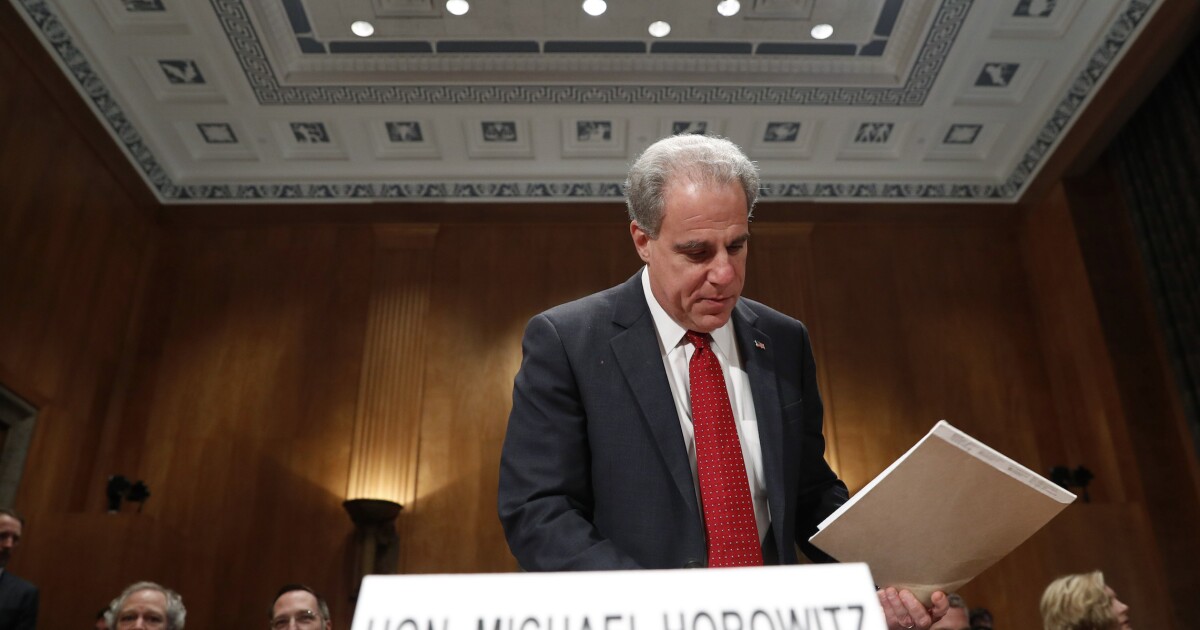

The Justice Department watchdog who unearthed serious problems with the FBI’s use of the Foreign Intelligence Surveillance Act during the Trump-Russia investigation told Congress on Thursday about “concerning” flaws with the bureau’s use of FISA powers.
Inspector General Michael Horowitz’s comments came during a hearing in front of the House Judiciary Subcommittee on Crime and Federal Government Surveillance on “Fixing FISA.”
GOP BLASTS BIDEN ADMIN’S “TRUST” ISSUE ON FISA REAUTHORIZATION
The portion of the FISA law the Biden administration is seeking to reauthorize is not directly connected to the Trump-Russia saga but rather relates to Section 702, which the Office of the Director of National Intelligence describes as “a key provision” of FISA “that permits the government to conduct targeted surveillance of foreign persons located outside the United States.”
The reauthorization has already met opposition from some Republicans in the House and Senate, given FISA abuses unearthed in part by Horowitz and related to the FBI’s use of British ex-spy Christopher Steele’s discredited dossier to obtain flawed FISA surveillance against Trump campaign associate Carter Page during and after the 2016 election.
ODNI revealed details last year on the number of Section 702-related searches by the FBI of data or communications of Americans. ODNI said this number was “fewer than” 1.32 million in 2020 and “fewer than” 3.39 million in 2021.
Rep. Matt Gaetz (R-FL) asked Horowitz about these more than 3 million “backdoor searches.”
“It’s obviously concerning that there are that volume of searches and particularly concerning the error rate that was reported on in the last two years,” Horowitz said, adding that he believed the error rate of mistaken or improper searches to be “around 30%.”
Rep. Jerry Nadler (D-NY) referenced a bipartisan letter he sent to then-Director of National Intelligence James Clapper in April 2016 pressing the DNI on the number of transactions from Americans that are subject to 702, and Nadler said that “seven years later, that number has not been provided.” Nadler asked Horowitz if the FBI had given him answers on this.
“They have not been reported to me,” Horowitz said, adding, “I will follow up with them, but my understanding is that their position has been that it would be impossible to come up with an accurate number, which I find concerning.”
Rep. Jim Jordan (R-OH) asked Sharon Bradford Franklin, chairwoman of the U.S. Privacy and Civil Liberties Oversight Board, if the FBI had declined to say how many Americans are picked up by incidental collection under 702 and if the FBI wouldn’t tell her how much data are picked up on Americans under this FISA power.
Franklin said, “That’s correct,” and that “the intelligence agencies have asserted that it is infeasible for them to calculate a meaningful number, and they have not done so.”
Horowitz’s report in December 2019 criticized the Justice Department and the FBI for at least 17 “significant errors and omissions” related to the FISA warrants against Page, for concealing possibly exculpatory information from the FISA court related to collusion denials by Trump associates, and for the bureau’s reliance on the Steele dossier.
The DOJ watchdog said Thursday that the need for better oversight is “highlighted by disturbing findings” in his recent reports, including those related to the FBI’s Trump-Russia investigation, dubbed “Crossfire Hurricane.”
“On the Carter Page FISAs, one of the serious problems that we found was the FBI was sitting on information and wasn’t telling the prosecutors that information,” Horowitz testified.
During his questioning of Horowitz, Rep. Tom Tiffany (R-WI) brought up Page and Kevin Clinesmith, who worked on the Hillary Clinton emails investigation and on the Trump-Russia inquiry, as well as on special counsel Robert Mueller’s team. Clinesmith admitted in August 2020 that he falsified a document during the bureau’s efforts to renew FISA surveillance authority against Page. Clinesmith edited a CIA email in 2017 to state that Page was “not a source” for the CIA when it had told the bureau on multiple occasions that Page had indeed been an “operational contact” for the agency.
Special counsel John Durham said Clinesmith’s deception “fueled public distrust of the FBI and of the entire FISA program itself.” Judge James Boasberg sentenced Clinesmith to just one-year probation in January 2021.
Tiffany highlighted recent revelations that former Obama acting CIA director and Hunter Biden laptop letter organizer Mike Morell said he was “triggered” by now-Secretary of State Antony Blinken in October 2020 to write the letter. The congressman asked Horowitz, “How effective will reform of 702 be if we can’t trust our intelligence agencies?”
“From my standpoint, I think it’s all about verifying and controls and oversight. You have to build in the appropriate controls for these programs,” Horowitz said, adding that current reforms “clearly haven’t been sufficient.”
Rep. Troy Nehls (R-TX) also brought up the errors of the Trump-Russia investigation, asking Horowitz what has been done to ensure something similar doesn’t happen in 2024.
“We made a series of recommendations in our review of the Crossfire Hurricane matter,” Horowitz said, adding that “most of those have been addressed, but not all of them.”
Rep. Andy Biggs (R-AZ) asked Horowitz about possible problems with the FISA Court, and Horowitz referenced “the lack of an adversarial process” in the Page saga, noting that the DOJ does not face a defense lawyer when pursuing FISA surveillance.
CLICK HERE TO READ MORE FROM THE WASHINGTON EXAMINER
A recently declassified intelligence document concluded that “misunderstandings regarding FBI’s systems and FBI’s querying procedures caused a large number of query errors” related to 702. Republicans have repeatedly said that the FBI’s trust problems with Congress were made worse by the new declassified report.
Originally conceived as mainly a counterterrorism tool in the wake of the deadly 9/11 attacks by al Qaeda, top Biden officials, including Attorney General Merrick Garland, have sought to emphasize the role FISA plays in combating threats posed by China and other foreign foes.





